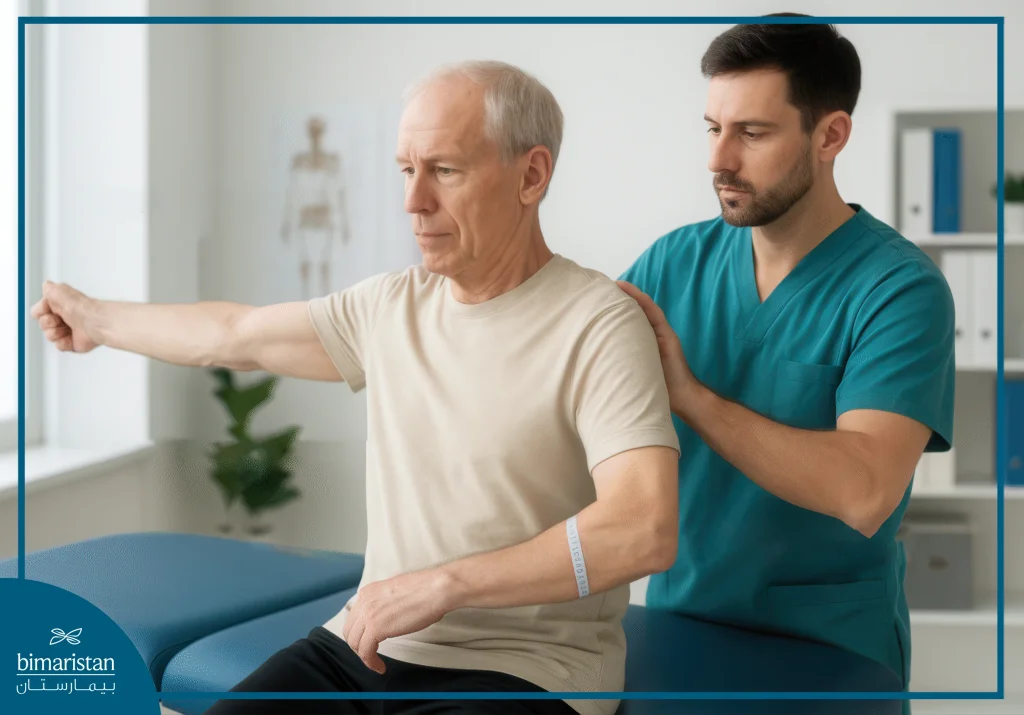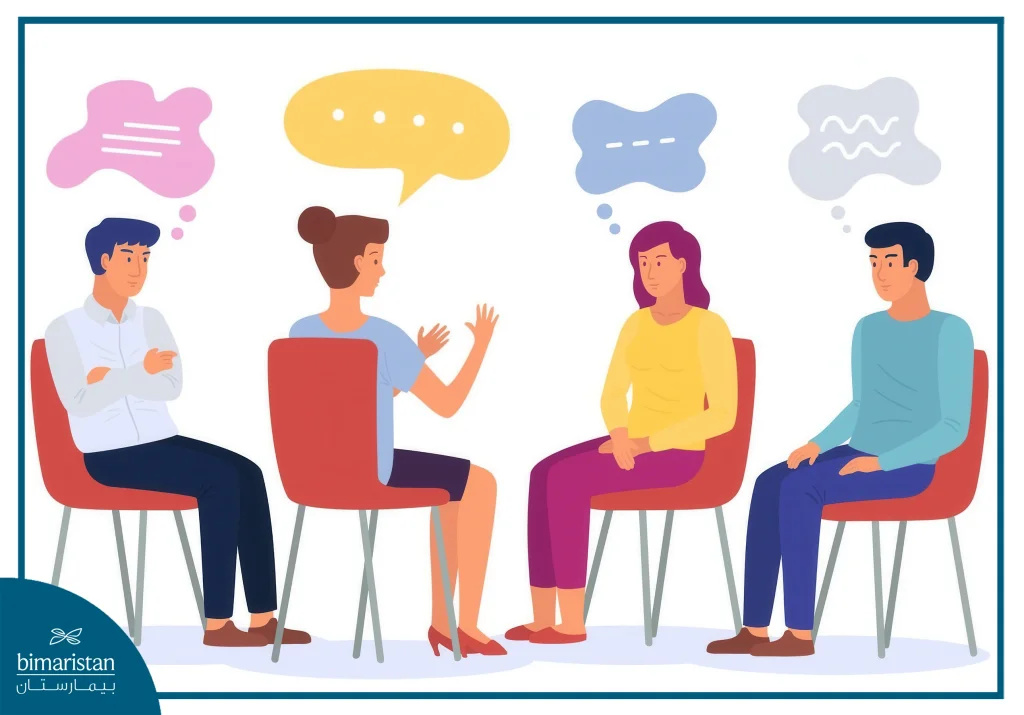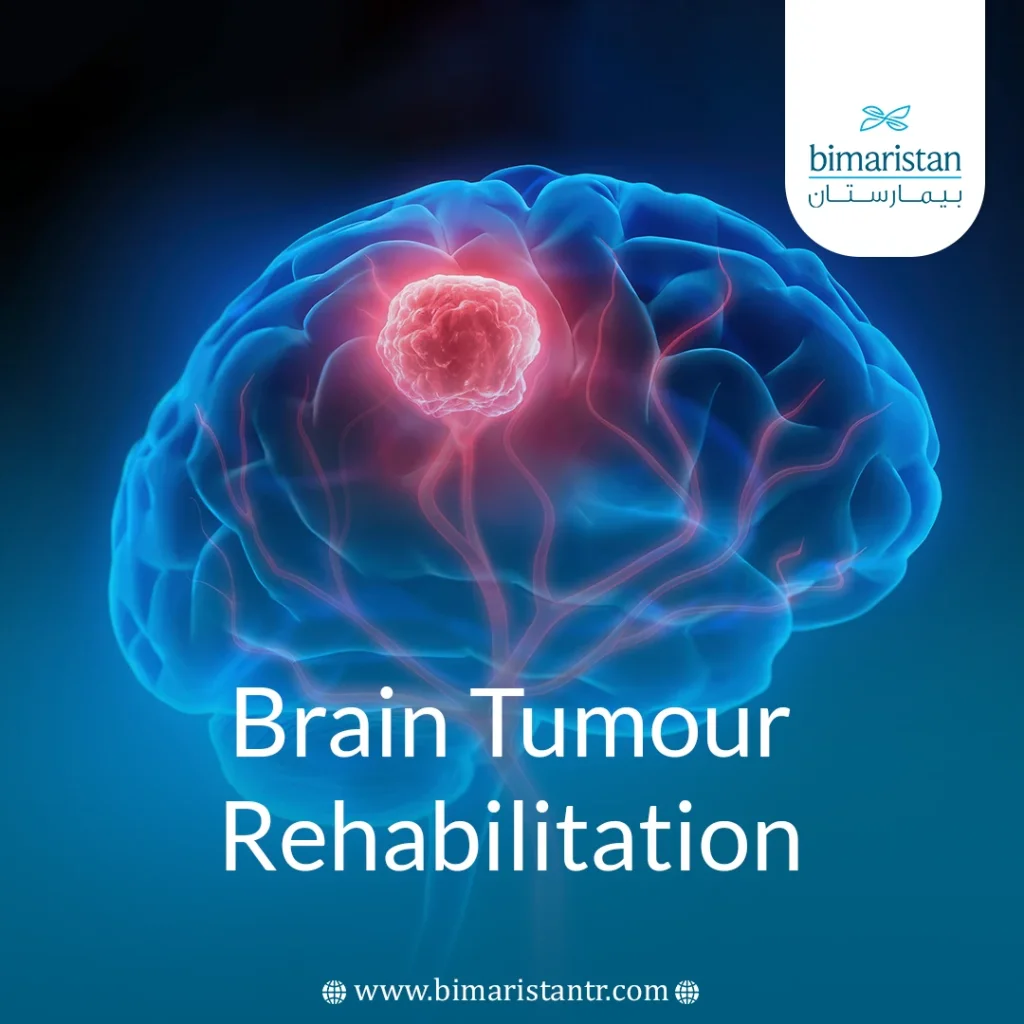Brain tumours are a complex health challenge, as they directly impact essential neurological functions. Managing this condition requires integrated treatment strategies with a strong emphasis on brain tumour rehabilitation. This process focuses on enhancing motor, cognitive, and psychological performance, ultimately improving patients’ quality of life and enabling their return to daily activities.
What is a brain tumor, and how does it affect neurological function?
Brain tumours are complex and severe medical conditions caused by the abnormal growth of cells in the brain. Tumours are classified into two main types: primary tumours, which develop from brain tissue, and secondary tumours, which spread from other parts of the body. These tumours vary in size, type, and behavior, leading to various neurological challenges, including:
Movement: Brain tumours can severely impact motor functions. Tumours pressing on brain regions responsible for movement may weaken patients or cause loss of mobility altogether. This can result in coordination difficulties, affecting essential activities like walking, writing, or grasping objects. Specialized therapeutic interventions in brain tumour rehabilitation centers are necessary to improve motor performance.
Speech: Tumours affecting the brain’s speech centers can disrupt a patient’s ability to articulate thoughts and understand language. Speech difficulties such as stuttering or misusing words can arise, negatively impacting communication and social interactions.
Memory and Attention: Cognitive abilities, including concentration and memory, can be impaired by brain tumours. Patients may struggle with retaining information or recalling past events, which can make daily tasks and conversations more challenging. Rehabilitation programs focused on cognitive improvement play a crucial role in recovery.
Emotions and Behavior: Brain tumours significantly affect mental and emotional health. Changes in brain chemistry can lead to mood swings, anxiety, or depression, altering a patient’s overall well-being and daily interactions.
Brain tumour rehabilitation goals
Brain tumor rehabilitation is an essential stage in the brain tumor recovery process as it contributes to restoring the quality of life for patients. The main goals of brain tumor rehabilitation include the following:
- Restoring neurological function: Brain tumor rehabilitation programs aim to enhance neurological functions affected by the tumor or treatment, such as improving mobility, speech, and cognitive abilities. Patients can regain their independence in performing daily activities through specialized techniques, contributing to their sense of control over their lives.
- Promoting independence: Brain tumor rehabilitation programs aim to help patients regain their motor and language skills, enabling them to return to their daily routines more easily. Achieving independence is essential for patients, as it allows them to return to the activities they love, boosting their self-confidence and reducing their dependence on others.
- Improved quality of life: Brain tumor rehabilitation significantly reduces the side effects of treatment, such as fatigue and pain, thereby increasing the psychological and physical comfort of patients. Patients can enjoy a more active and engaged life by improving motor and cognitive functions through brain tumor rehabilitation programs.
- Providing psychological support: Mental health is an essential aspect of the recovery process. Psychological rehabilitation helps patients deal with the mental and emotional stress of the disease. Patients can develop effective strategies to cope with the changes in their lives through psychological support sessions at brain tumor rehabilitation centers.
Multidisciplinary brain tumor rehabilitation
Brain tumour rehabilitation is a vital phase in the recovery process, helping patients regain their quality of life. The primary goals of brain tumour rehabilitation include the following:
- Restoring neurological function: Brain tumor rehabilitation programs focus on enhancing neurological abilities impaired by the tumor or its treatment, including mobility, speech, and cognition. Through specialized therapies, patients can enhance their independence in daily activities, regaining control over their lives.
- Promoting independence: Brain tumour rehabilitation aims to restore motor and language skills, easing patients’ return to their routines. Regaining independence enables individuals to engage in activities they enjoy, thereby boosting their confidence and reducing their reliance on others.
- Improving quality of life: Brain tumor rehabilitation minimizes treatment-related side effects, such as fatigue and pain, thereby enhancing both physical and psychological well-being. By improving motor and cognitive functions, patients can lead more active and fulfilling lives.
- Providing psychological support: Mental health plays a key role in recovery. Psychological brain tumor rehabilitation helps patients navigate the emotional challenges posed by the disease. Support sessions at brain tumour rehabilitation centers equip patients with strategies to adjust to life changes and maintain emotional resilience.

Physical therapy to improve mobility and balance
- Brain tumour rehabilitation through physical therapy is a crucial aspect of recovery, playing a significant role in restoring mobility and balance. It focuses on improving patients’ quality of life and helping them regain independence in daily activities. Several effective physical therapy techniques are incorporated into brain tumour rehabilitation, including:
- Strength training: This enhances muscle mass and functional ability, enabling patients to perform everyday tasks with greater ease and efficiency. Using light weights and resistance training helps strengthen core muscles, supporting overall mobility.
- Balance exercises: These exercises improve coordination and reduce the risk of falls, which is essential for patients experiencing motor difficulties. Activities such as standing on one foot, walking in a straight line, or using stability aids like a Swiss ball can enhance balance.
- Movement techniques: Various movement techniques, such as hydrotherapy, create a supportive environment for improved mobility. Water-based therapy reduces joint stress and facilitates movement, making it an ideal treatment option for patients with pain or mobility limitations.
- Group sessions: Practicing language skills in a social setting boosts confidence and encourages patients to apply newly acquired abilities in everyday interactions. These sessions also reduce isolation and foster a supportive environment.
Speech and language therapy for brain tumor rehabilitation patients
Brain tumour rehabilitation includes speech and language therapy, which is crucial for patients facing communication challenges. Tumours affecting language and speech centers can lead to significant difficulties in expressing thoughts and understanding verbal interactions.
Early intervention in speech therapy is essential, as it enhances treatment outcomes. A comprehensive approach incorporating various techniques helps improve communication skills, including:
Speech exercises focus on improving speech intelligibility by emphasizing correct pronunciation. Techniques such as repeating words and sentences help patients gradually develop clear articulation.
Alternative communication strategies offer effective methods for patients who struggle with verbal expression. Tools such as communication boards or specialized apps help convey thoughts and emotions.
Linguistic exercises help strengthen comprehension and expression. Reading texts, listening to conversations, and engaging in interactive activities contribute to vocabulary development and linguistic understanding.
Group sessions offer a supportive environment where patients can practice language skills. These interactions help boost confidence, encourage social engagement, and reduce feelings of isolation.
Psychological and cognitive rehabilitation after surgery or radiation therapy
Brain tumour rehabilitation includes psychological and cognitive recovery, which is essential for patients who undergo surgery or radiation therapy. Many individuals experience cognitive and emotional challenges due to treatment side effects, requiring integrated strategies to support mental health and cognitive function. Key psychological rehabilitation strategies include:
- Psychotherapy plays a crucial role in supporting mental health. It involves individual or group therapy sessions that help patients address anxiety and depression, express their emotions, and process their experiences. Techniques such as cognitive behavioral therapy (CBT) are used to modify negative thinking patterns and strengthen coping skills.
- Counseling and psychological support help patients accept their condition and adapt to life changes. Providing information about the disease and treatment process enhances understanding and equips patients with strategies to navigate daily challenges effectively.
Key cognitive rehabilitation strategies include:
- Cognitive training focuses on enhancing essential brain functions, such as memory and concentration. Activities such as brain games and memory exercises stimulate cognitive abilities, fostering critical thinking and problem-solving skills.
- Relaxation techniques, such as meditation and yoga, help alleviate stress and anxiety while enhancing self-awareness. These techniques contribute to mental well-being and are beneficial when integrated into daily routines as part of brain tumour rehabilitation.

Brain tumour rehabilitation relies heavily on strong family and social support, which plays a crucial role in improving patients’ quality of life. Families and communities must take active steps to assist patients throughout their recovery. The family’s role includes:
- Providing a supportive environment that fosters encouragement and positivity. Families can help boost patients’ morale by motivating them to engage in social and recreational activities, which improves mood and strengthens their sense of belonging. Social interactions reduce feelings of isolation and reinforce emotional connections.
- Providing daily care is essential for reducing both mental and physical stress. Assisting with everyday tasks such as cooking and cleaning helps alleviate stress, allowing patients to focus on recovery and enhancing their overall well-being.
- Participating in rehabilitation sessions provides valuable insight into patients’ needs and enhances their treatment outcomes. Families can offer psychological and emotional support by actively engaging in rehabilitation, helping patients navigate challenges more effectively.
- Providing information about the disease and its treatment enables families to offer meaningful support. Seeking reliable knowledge on brain tumour rehabilitation and its impact helps reduce anxiety and equips families with strategies to assist patients through their journey.

Support extends beyond the family to the broader community. Local support groups provide a safe space where patients can share their experiences and receive emotional support. Connecting with others facing similar challenges fosters understanding and provides comfort throughout the rehabilitation process.
Brain tumour rehabilitation is a crucial phase in the recovery journey, playing a vital role in restoring neurological function and enhancing quality of life. By promoting collaborative teamwork and providing psychosocial support, patients can navigate and overcome the difficulties they face. Investing in rehabilitation programs has a significant impact on both patients and their families, fostering resilience and enhancing overall well-being.
Sources:
- Park, J., & Park, Y. G. (2022). Brain tumor rehabilitation: Symptoms, complications, and treatment strategy. Brain & NeuroRehabilitation, 15(3), e25.
- The Brain Tumor Charity. (n.d.). Rehabilitation.
